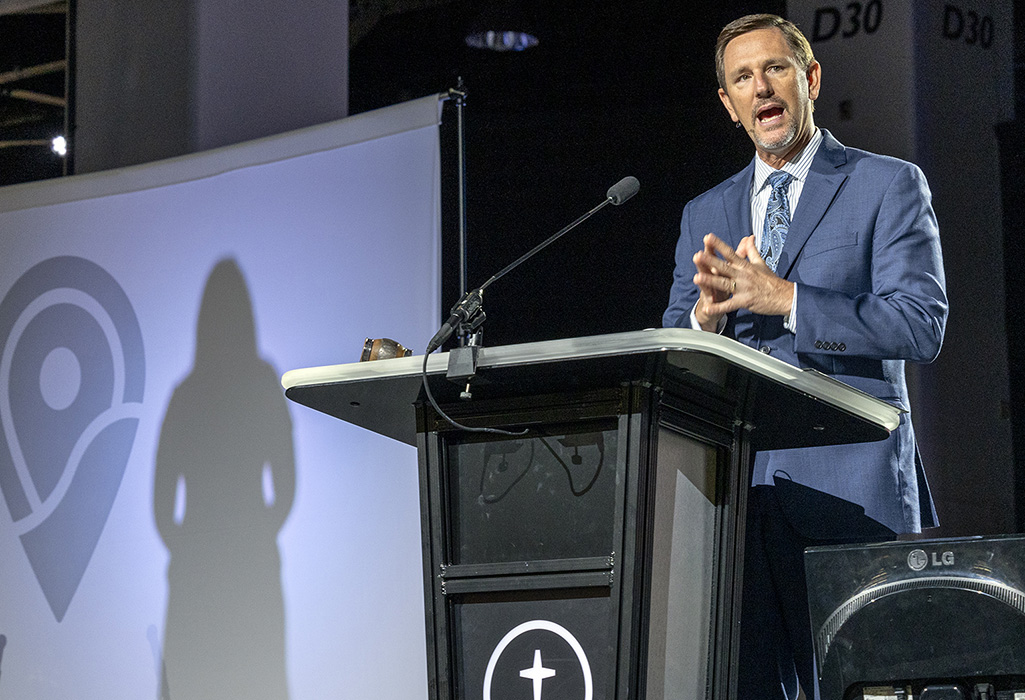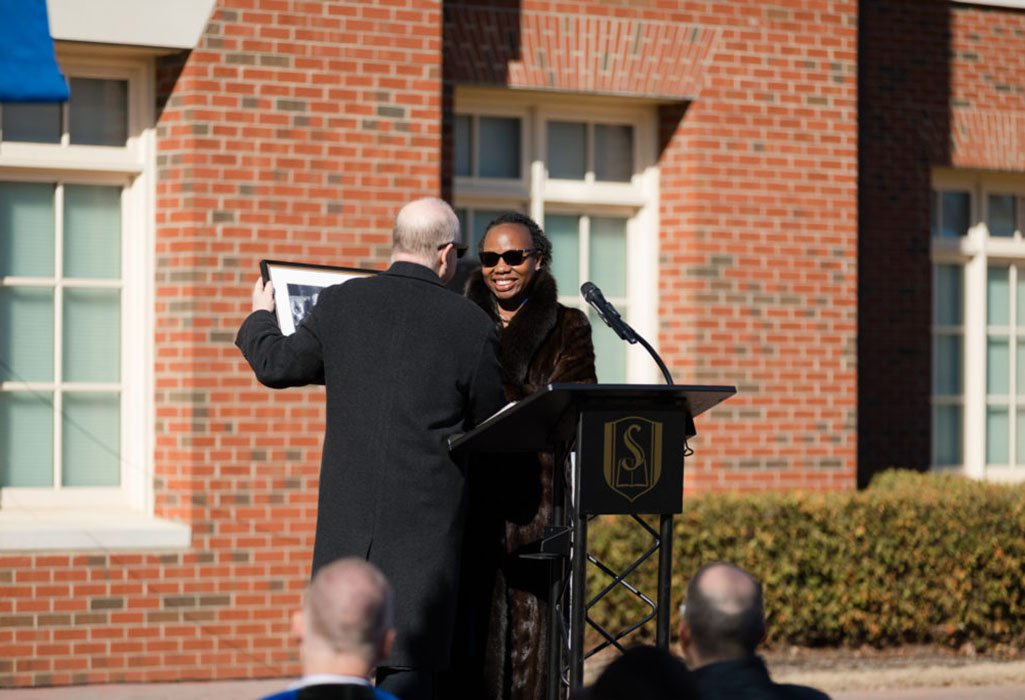
From training at Southeastern Baptist Theological Seminary (SEBTS) to missions in the Asian Pacific Rim, Thomas and Harper McKay* have grown in their understanding of the Great Commission and what it means to seek God’s kingdom as servants of Christ. Now, they labor with their fellow missionaries and the International Mission Board (IMB) to bring the gospel to those without hope, living in the darkness of false religion.
“Is it even worth it?”
The question posed was one that resonated deeply in Harper’s heart, and she saw a familiar anguish reflected in the eyes of her team member, awaiting Harper’s response.
She thought back over the past few years on the mission field — the frustrations and sometimes thankless work of discipleship; the many, seemingly fruitless hours of labor; the countless events, holidays and family get-togethers she and her husband had missed; and the hug she never gave her father before he passed away from cancer. She had been unable to make it back to the states in time.
“No,” she said and watched as her friend’s eyes widened in shock. “It’s not worth it … but Jesus is.”
Stepping forward in obedience
Years ago, as an introvert, the idea of going on the mission field and sharing the gospel with strangers filled Harper with trepidation. When God began to impress on her heart that this was His desire for her future, she tried to ignore the calling as best she could.
One evening, however, the call was unmistakable. During a missions fair at her church that night, Harper listened as an older woman, a missionary who had served in the Middle East for 54 years, got up and read the story of Moses and the burning bush. It was the very story Harper had read earlier that day in her quiet time.
After the story, the missionary turned toward her listeners and said, “God does not want our excuses. He wants our obedience.”
From that moment, the path forward was clear, and Harper decided it was time to step forward in obedience.
Little did she know, God was also at work in the heart of her future husband, Thomas. In the middle of college, feeling the pressure to pursue select internships and invest in a future career, Thomas felt the Lord leading him away from the American dream and toward some kind of ministry, though he wasn’t sure what.
That summer, instead of an internship, he went on a trip to serve in Asia-Pacific where he experienced his first taste of international missions.
“It was like drinking from a firehose the whole summer,” Thomas recalled, “and the Lord really used that to begin to redirect my life.”
It was not long before God brought Thomas and Harper together, uniting in them a love for His kingdom, the nations and each other.
Thomas and Harper met during Journeyman training to go overseas on the mission field. While on their separate mission assignments, they kept in touch, seeing each other only a few times on trips with fellow Journeymen. Upon their return to the states, Thomas and Harper got engaged, and they began planning out the next few years of their lives. While both felt the call to missions, it was tempting to put that plan on hold and see what it would be like to settle down for several years before going overseas.
However, through the convicting words of Scripture and difficulty in finding jobs, it soon became apparent that God was not asking them to wait. The nations needed to be reached. So, Thomas and Harper began searching for a seminary that would fit their needs and prepare them to go long-term on the mission field.
Preparing for the field
With their future intentions clear, Thomas and Harper were hopeful of finding a place that would both further those intentions and welcome them into a like-minded community.
It was these goals that made SEBTS and its Great Commission focus so appealing.
Reflecting on their decision to move to SEBTS, Thomas noted, “A number of Journeymen that we trained with and were very close with had already or were about to move to Southeastern. So, it was the biggest support network outside of our hometowns that we could find, and we knew we’d have community there already.”
When visiting Southeastern on a campus tour, Thomas and Harper were surprised to find that, not only was missions a central focus of the institution, but Southeastern also encouraged and prioritized students’ involvement in their local churches.
Over the next year and a half, God would use both SEBTS and the McKays’ local church body to expand their understanding of the Great Commission, prepare them for future ministry and teach them how to shepherd those in need.
“We got a sense that the Lord was preparing us for more shepherding on the field,” they recalled, thinking about the opportunity they had to lead a small group within their church. “There was a new believer that lived with us for a very brief time, and we felt like the Lord was saying, people who don’t have anywhere else to go are going to live with you when you’re on the field. We knew that people whose lives have fallen apart were going to need us on the field, and that was something that local church ministry began to prepare and equip us for.”
During their season at SEBTS, Thomas also grew in his understanding of the Great Commission and the way in which God calls people to different roles to further His kingdom.
He remembered asking, “If God really cares about this thing that He’s calling me to, why isn’t He calling everyone to that? And that was something that was just easily and gently melted away while I was at Southeastern. I began to better understand all the different and special things God is calling His church to do.”
Both Harper and Thomas recalled how impactful it was to see leaders at Southeastern, especially President Danny Akin, demonstrate humility and willingness to learn, setting the tone for the institution.
“I got to see really smart, godly people — staff, professors, etc. — disagree about things in a way that honored each other in the Lord,” Thomas explained, “and that had a huge impact on me.”
It was not long, however, before the McKays’ time at SEBTS came to an end, and they said goodbye to the Wake Forest area and their local church family. The mission field was waiting for them, as well as years of language study, cultural acclimation and many challenges they could not anticipate.
Missions on the Asian Pacific Rim
In the place where Harper and Thomas serve, Islam is the primary religion, and the people of that region have little to no religious freedom. Conversion to any other religion could result in social ostracization, loss of employment, physical harm or severe pressure from the government to reconvert. However, of all of these things, the barrier that prevents many from turning to Christ is the likelihood of losing their family.
“A good bit of our time so far has been spent with a few believers, specifically one,” Harper explained. “And we have tried to walk the road with this believer and help them count the cost. And it’s not a one-time counting of the cost. It happens every holiday, every important family event, even though this particular person has not told his or her family. There’s an immediate feeling of isolation because they have stepped outside of what their community wants for them.”
This feeling of isolation, as well as the fear of being betrayed to the government, makes it difficult for local believers to meet together regularly.
“When we first got here,” Harper recalled, “our mentality was that we have to tell local believers that they need to be reaching out to those hard-to-reach people. And we have to say it directly to them, or it doesn’t count. But we live in a very indirect culture. And so, we’ve noticed, the longer we’ve been here and the longer we just share about our lives and what we’ve been doing, the more people ask us questions, and the more we hear people say, ‘You know, I’ve been thinking, you came all the way from another country to share with people, and why can’t I do that?’”
Sometimes gospel work has looked like dedicating each Tuesday evening to sitting outside at the market stalls near their house, waiting for people to engage them in conversation. One night, a stranger did, a lady who would continue speaking with them for years to come and whose family would become their close friends.
Thomas and Harper have also learned that missionary work requires listening and humility and that coming alongside the local church should be an act of service and not of control. Furthermore, ministry takes time. In the same way that true relationships are built over many years, so also does it take patience waiting for ministry opportunities to arrive. And sometimes, those ministry opportunities are not what they would expect.
During their second year on the field, Thomas and Harper were given the surprising opportunity to serve as team leaders for the missionaries serving in their area. At first, they balked at the idea.
Team leadership did not fit the future they had foreseen for themselves. It would be humbling to step back and take on the role of equipping others instead of regularly being a part of face-to-face ministry with lost people where it is often easier to see personal impact.
However, God worked in their hearts, and Thomas remembers how humbling it was to be reminded of the Christian’s true role in the kingdom and in missions.
“It doesn’t matter if I’m predominantly a face-to-face evangelist or a pulpit and church mobilizer or a trainer of this or a doer of that,” he said. “The most important thing to ask is, ‘Lord, how do you want me to be a servant of the gospel?’”
Life on the mission field has not been easy, and serving as team leaders has presented many challenges. While Harper and Thomas have seen much growth, both in themselves and in others, there have also been moments and seasons of great discouragement.
The climate in which the McKays serve is heavily spiritual, and false religion is a constant presence. The few locals who are believers continue to fight discouragement as they share the gospel with their family members — many of whom are growing older and dying — but do not see the fruit of faith in return.
Asking what it’s worth
Harper remembers well the heartbreak of being unable to return to the states in time to say goodbye to her own father, who passed away after a battle with cancer.
Sometimes the task before them seems insurmountable, with the harvest wide and the laborers few. When asked by one of her team members if it was all worth it — the sacrifice, the struggle and the loss — Harper gave her friend an honest answer.
“No, it’s not worth it, and it’s not good enough to keep us here,” she said. “But Jesus is worth it.”
“And so, who Jesus is and what He has done for us — that is the only thing that is actually ever worth it.”
As they continue to serve in the Asian Pacific Rim, Thomas and Harper are learning to abide in Christ, which, they say, is the ultimate essential of missionary work.
“We talk about not placing work before worship, not putting the book before the Author, and never prioritizing the Great Commission before the Great Commandment,” the McKays explained.
“If you follow those three things, then what you get is: We want to be worshipers of Jesus who want to know Him, love God and love others with all of our hearts and minds and strength. And that’s the core. Cross-cultural work, language learning, platforms, teams and strategies — they’re not secondary. They flow from that.”
“The Lord is reviving the hearts of His children, and it’s for His work,” they shared. “And we know that that’s going to include every type of person that lives here.”
With these truths in mind and with the strength that Christ provides, Thomas and Harper continue to seek to make the gospel known in their end of the earth.
(EDITOR’S NOTE — Join in praying for Thomas and Harper, that they would continue to abide in Christ, that God would grant them wisdom and direct their paths and that they would live with the end in mind. Pray also for growth in faith within the local church bodies in their area and that the gospel would be known and believed in greater measure than ever before. Names have been changed for security purposes.)


